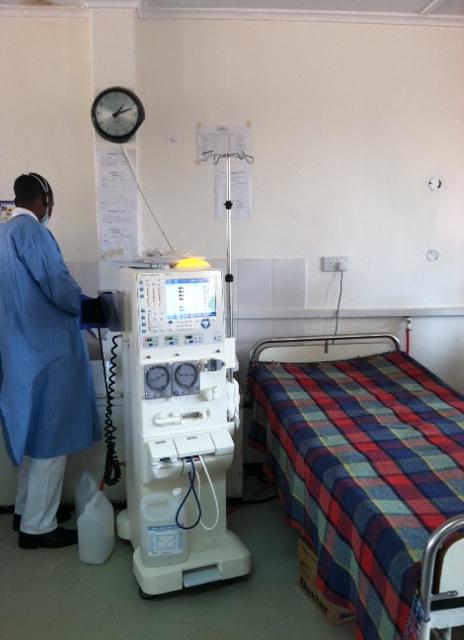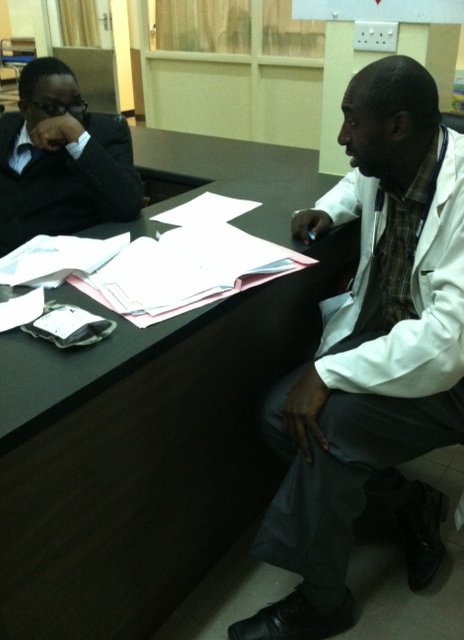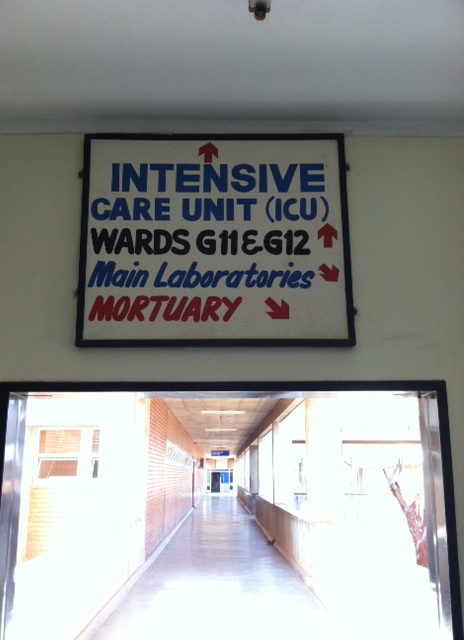Written by Hongyu Zhao, MD, PGY-2 and Qing Meng Zhang, MD, PGY-2 at Kaiser Permanente…
A Few Difficult Days
8/7/12
Posted by Amanda Thornton, MD (a third year Internal Medicine resident from Kaiser Permanente, Oakland while on a global health elective in Lusaka, Zambia with University Teaching Hospital).
Though I’m feeling a bit better from my cold, it’s been a rough few
days at UTH. This weekend was a long weekend due to the Farmer’s
Holiday, (which allowed residents of Lusaka to attend the annual
Agricultural fair) but my team was on call Sunday. I went during the
day, but because I have no taxi to return to the hospital at 4am for
morning rounds and the uncertainty of transport home on the holiday- I opted to go home and not return until today, our next call day.
Sunday was particularly hard as several of our patients in filter
clinic passed abruptly and our teams are in the process of shifting
attending physicians and interns.
I have been doing my best to see all the facilities that UTH has- by
following a select few of my team’s patients as closely as my schedule
allows. I’ve been following a 30 year old female with hypertensive
kidney disease on dialysis. She presented a few days before I arrived
with acute on likely chronic renal failure. Although she did
not have funds for dialysis, a physician donated a dialysis catheter
and the first 10 rounds of dialysis in the hopes that her renal
function would eventually improve or (as the family promised, given
the extra time) steady funds would be raised for her to continue
dialysis treatment.
She goes to dialysis 3 times a week (from the low cost wards) through
the donated temporary port, but there are no physicians to construct
fistulas at this facility and she will have to get a permacath (more
permanent dialysis access) placed if she continues on dialysis. I
visited the dialysis unit (and waved to her while she was getting
treatment) where I saw the recognizable machines with good staffing
with trained nursing. I was told that there are a few perotoneal
dialysis patients who get home treatment, but otherwise hemodialysis
takes place at UTH three times a week- and patients pay out of pocket.

Nephrologists are consulted on on the wards when patients might
require dialysis- a 22 year old patient from our team with TTP
(thrombotic thrombocytopenic purpura) of unknown etiology has not been improving with supportive management. Today we called the
nephrologist to our work-rounds at the bedside to discuss the
indications for potential dialysis.
Some things are very familiar here, though the resources are
different. Another one of our patients, a 70 year old male with
cardiomyopathy who presented in cardiogenic shock has been having
difficulties weaning off dobutamine in the intensive care unit. Dr.
Chenyenu (the clinical Internal medicine department head) and Dr.
Chimanu (one of the internal medicine team leaders)- shown below-
discussed the patient’s management and the possibility of needing to
have the patient transferred to South Africa to get a cardiac
catheterization or further investigation into the possible causes of
our patient’s heart failure. Because there are sometimes as few as 5
attending physicians for as many as 300 medicine beds in the hospital,
the hospital could not run without such a spirit of cooperation
between physicians and difficult cases are frequently discussed
between attending physicians so that the hospital resources can be
effectively allocated.

The intensive care unit has patients who are stable on continuous
infusions, unstable or require artificial ventillation- there are many
nurses, doctors and physiotherapists (physical therapists) who come
through at regular intervals. One of our patients, a male in his 30s
who presented with tuberculous meningitis spent over three weeks in
the intensive care unit before being transferred to the high cost ward
(where his family pays for treatment). During his ICU stay, despite
the nurses and physician’s best efforts, he developed a severe
pressure ulcer and a methylcillin resistent staph aureus bacteremia
(MRSA blood infection). Here the lab does not do drug levels, nor
does it have the capacity to process daily creatinine- physicians
treat MRSA with 5 days of vancomycin based on an initial assessment of
renal function and the follow up blood cultures and kidney function
after treatment has been completed. For our patient, his meningitis
has improved, but he is severely cachetic and at risk for further
iatrogenic complications. We brainstormed ideas at the bedside on how
to avoid continued fecal contamination of the pressure ulcer and
improve healing so that he would be well enough for discharge.

In the mean time, I have been trying to figure out the ways I can be
most helpful to my team when I’m not learning about the presentations
and treatment of tuberculosis and complications, advanced AIDS and the art of physical exams. I’ve done some patient counseling (which is
interesting, usually it has to be performed through an interpreter and
there are many cultural things which I often need to have a medical
student explain to me). I’ve also been taking pictures of the
informational posters which are hung up around the hospital, though I
have discovered that few of the patients and families are able to read
well enough that a poster replaces the need for verbal reinforcement.
My team is on call tonight, but I’ve written this journal from the
library where I’m reading (again) about the many presentations of
tuberculosis during a lull between seeing hospitalized patients and
when we do our official rounds in the filter clinic (Emergency room
equivalent). My single goal tomorrow is to head to the clinic where
Dr. Mukumena sees patients in an under served area close to Lusaka-
and he has also promised to speak to his wife, who is a physician at a
community hospital nearby, about the possibility of my visiting there.
He has introduced me to several of the physicians who do research at
University Teaching Hospital- my hope is to be able to connect with
the infectious disease department head and work on a patient
presentation or a brief study to round out my experience at UTH.
But for now, lunch and then overnight call…
Comments (2)
Comments are closed.
I’m enjoying reading about your experiences, Amanda — and hope you feel better soon!
Thanks so much Dana!